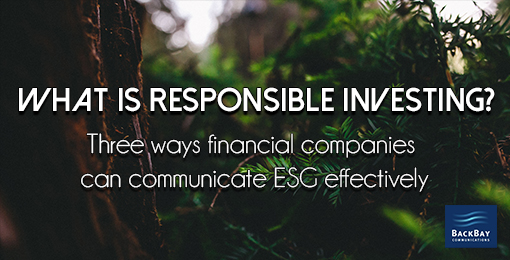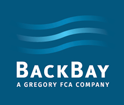Common myths and misperceptions on ESG (environment, social, and governance investing) were discussed by a panel of in-house financial services company representatives at a recent breakfast on “The Rise of Responsible Investing” hosted by The Financial Communications Society. Panelists included Anthony Eames of Calvert Research and Management, Chris Berry of State Street, Emily Chew of Manulife Asset Management, and Marla Skeffington of Natixis Investment Managers. Noel Friedman, of MSCI Inc. moderated the panel. The discussion took place at Eaton Vance in Boston.

Responsible investing by any other name
As a foundational step, clients should understand why they want to align their investments with their personal or organizational values. And while the specific nomenclature and acronyms related to aligning investments with one’s core values remains somewhat in flux, understanding the reasons behind the desire to put one’s values to work through an investment portfolio can effectively cut through confusion, panelists agreed.
Some basic definitions can help inform such considerations, as there are many approaches to ESG investing:
- Negative or ethical screening means identifying portfolio components that are not consistent with an investor’s social values. Examples might include a healthcare company that screens out tobacco stocks that it views as counter to its mission, or an individual investor who is concerned about climate change removing fossil fuel companies from her or his portfolio.
- Impact investing is the flip side of negative screening. Rather than avoiding certain stocks, impact investors seeks to positively affect society by putting their capital to work through a particular company, industry, or sector. An impact investor might also seek to change a company or industry by owning securities that provide voting rights to change the course of a company’s board or management.
Generational change
Millennials, who came of age during the global financial crisis, value stability, one panelist said, and despite historically high levels of student debt, the workers in this age range, generally born between the early 1980s and mid-to-late 1990s, are now saving for retirement.
This generation will also make up roughly 75% of the global workforce by 2025, said Marla Skeffington, who discussed opportunities and demand for responsible investing products in the defined contribution space. Skeffington highlighted that most of the wealth currently owned by millennials is in retirement accounts. “Right now, $5.3 trillion is in defined contribution plans; roughly $1.7 trillion of this in target-date funds. It’s a huge part of the industry,” she said.
In addition, generational wealth transfer is also occurring from Baby Boomers to Generation Xers and millennials. A survey of defined contribution participants that her firm conducted in 2016 found that 82% of millennials wanted their investments to align with personal values, 74% wanted to see socially responsible investing (SRI) choices offered in their plan, and over 60% said they would contribute more to their plan if they knew it would do good.
“What these companies and organizations need to do is figure out a way to incorporate ESG investment choices in these plans because they have to engage this next generation,” Skeffington said.
This is not your 1970s SRI
A common perception that responsible investing yields underperformance has roots in some of the earlier products available in the 1970s that, in fact, resulted in lesser performance, said panelists. They agreed that today, however, SRI products have greatly evolved, data is better, and trading alpha for SRI is a false dichotomy.
In fact, a theme echoed in the discussion was investing in companies that manage risk is a good investment practice overall. “It all comes down to integration,” said Chris Berry of State Street. “It has to be a consideration in your investments…. [I]s this company [that you’re invested in] sustainable, in that they’re maximizing today’s returns without sacrificing tomorrow’s returns? That is the definition of sustainability.”
Conclusion
For financial services companies broaching ESG for the first time, or those who have offered ESG services to clients for many years, client communication and education remain both first steps and top priorities.
This can be achieved through myriad ways, including content, such as white papers, that explain a firm’s philosophy on ESG, or broader discussions on the changing nature of the space to help prompt existing clients and prospects to further define their interests and desires to put their own capital to work in a way that is reflective of their values.
Please contact us for more information on BackBay’s public relations and integrated marketing services.


